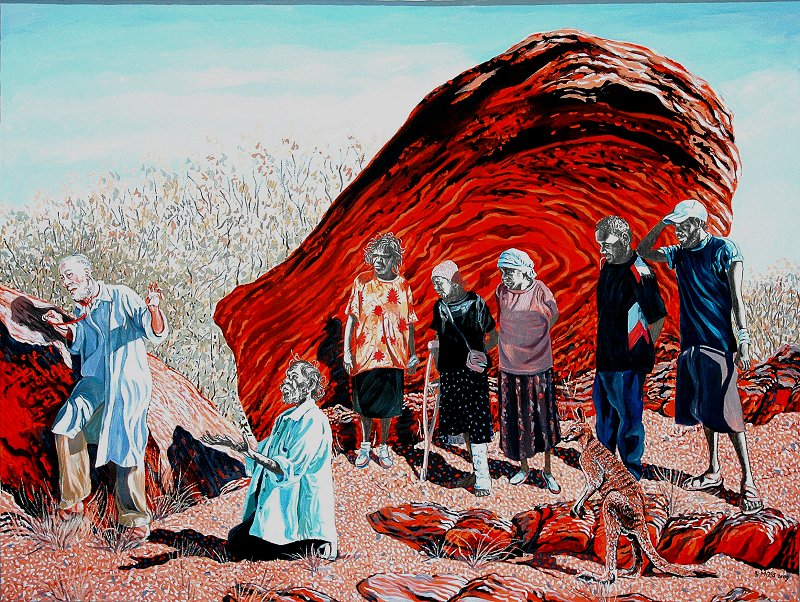Letter from Doomadgee
27 January, 2014.
Dear Australia,
Before I arrived the only thing I knew of Doomadgee was the name; that was the surname of the man who died on Palm Island. That name seemed compounded of doom and tragedy. But of the community itself I was glad to know nothing in advance of my arriving.
Steve the factotum drove me from the airfield. The aged street sign said:
Welcome to Doomadgee
Population 1200
Steve said: “More like 2000.”
I met the young Aboriginal doctor. He said: “More like 3000.”
A road sign said:
NT Border 103 KM.
The weather forecast said: Cloudy. Maximum 34 degrees.
That night the nurse said:” It felt hot so I looked at the thermometer on my verandah. The thermometer said: ‘52 degrees.’”
I said to the young Aboriginal doctor from Mt Isa, himself a grandson of respected elders of this community: “I’m the wrong doctor. I don’t have the language, the cultural currency…You are the right sort of doctor.”
He said: “There are nearly one hundred of us now. There were quite a few of us in my year at James Cook.”
The two of us spent most of Saturday together indoors. Between snatches of cricket and tennis on TV and poring over Murtagh’s tome on General Practice, he wanted to talk about religion (his new found Christianity, my old found Judaism), about work, about vocation. He asked me to name my favourite story from the Bible.
He told me his. I waited for a parable. Instead he said: “Jephtah and his daughter. I read that story and I put the book down and I said, ‘Lord, I need time to come to terms with this.’”
We spoke of our families and our upbringing, how he hankered for some city life while knowing his destiny lay in the country – on country – this country, this country his father had shown him and taught him and inculcated into him from early years; and I told him of my lifelong hankering for life outside the city while knowing my destiny lay there.
I said: “I wrote a book about my father – he was a country GP – and about my childhood in the country. And another book about my experiences working in remote Aboriginal communities. You can get copies of those books if you’re interested.”
He said: “No. I don’t read books. Only medical textbooks.”
I looked at him.
He conceded: “I did read two other books. My teacher said if I didn’t read them I couldn’t pass English.”
I looked at him again. I said: “I know you read. You read all the time – the Bible.”
“Yes. Yes, that’s so. I’m always reading the Bible. But books, they’re not in my background. We didn’t have books at home.”
After hours of searching conversation my colleague posed a question. He preceded it with a statement. He said: “I want my work to mean something. I want my working life to improve the lives of Aboriginal people.” He swallowed the consonants whenever he spoke that word. He softened the ‘g’ in ‘Aboriginal’ so it was like a triple ‘n’, gutturalised. He paced and paused, paced again. He said: “I want to ask you a question. You’ve been a GP for a long time; I am just starting. What should I do? I mean what should I do now, while I’m completing my training? What particular field should I try to master? What will be most useful for Aborinnnal people?”
I offered some answers, thinking aloud, feeling my way through a variety of ideas. Eventually I said: “Any answer I give will be less important than the question.”
“What do you mean?”
“I mean, you aren’t asking a casual question. This is a quest. So long as you keep asking I think the quest will lead you where you need to go.”
Then I said: “You know we whitefellas do our best but we never achieve what we set out to do. I think the answers won’t come from whitefellas alone; some of the changes have to come from blackfellas. It will be like cancer – you don’t find the cure, the single thing that wipes out the entire problem; you find an improvement here, a sectional breakthrough there. So the Pearsons and Yunipingus and Langtons and the others, they’ll come up with some initiatives; and some of those will take root and some might bear fruit.”
My friend nodded hard. He said: “Exactly!”
***
On Australia Eve, the rain belted the roof all night. Australia Day dawned bright, cooler. We went down to the river. At the spillway the Nicholson flowed a kilometre wide. Warm brown water, shallow. Steve had said: “No big crocs here. Only little snappers – freshies.”
I trusted him. I waded with the younger doctor through warm shallows down to the waterfall. Everywhere we went in those shallows Aboriginal toddlers paddled, babies sat on the laps of slender young mums. The Nicholson flowed a thin caramel around and over shiny brown bodies.
The young doctor spoke to all he met. All were, one way or another, his kin. He said: “Hello brother”, and “Hello sister.”
He said, “Hello Aunty”, and “Hello Uncle.”
He knew what to say, how to say it. He found connections with strangers.
He knew his country; he was the right doctor; he had the language.

Dear Howard
Worldpress asks me what I think. Today I can’t help it, but answer this question. I LOVED IT. What insight! You also prove that we are receiving more than we give if we only try.Thank you.
I am sure you know the book “Why warriors lie down and die”. I had to think of that while reading your blog today. Maybe that young doctor would consider that a medical test. He may end up teaching other some knowledge they need to bridge the divide.
I always enjoy your blogs,
Susanne
LikeLike